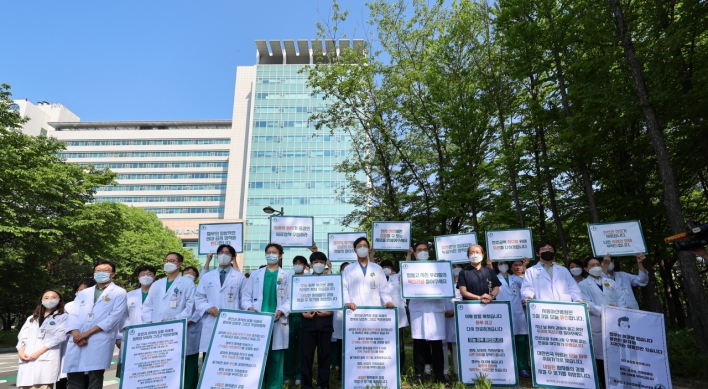The new accord on sharing the costs of keeping U.S. troops in Korea faces a rough ride in the National Assembly, with opposition lawmakers churning out criticism over a sharp rise in Seoul’s burden and its failure to achieve further administrative improvement.
After grueling six-month negotiations, the two countries reached a deal on Saturday to renew the Special Measures Agreement, under which South Korea will pay 920 billion won ($871 million) this year to support the 28,500-strong U.S. Forces Korea, up 5.8 percent from a year before.
The figure marked a hard-won compromise with the U.S., which initially demanded at least 1 trillion won a year. Observers had forecast that the allies would meet somewhere between 930 billion won and 950 billion won.
In return, Washington agreed to boost coordination and operational transparency by providing detailed reports regularly on how the funds are allocated and spent, which could then be revealed to the National Assembly.
While the ruling Saenuri Party gave credit for the institutional enhancement, the main opposition Democratic Party blasted the Foreign Ministry for a lack of measures to plug loopholes.
“There are some good results such as expanding prior consultations on the allocation stage and reinforcing parliamentary reports, but that’s not enough,” DP spokeswoman Rep. Bae Jae-jeung told a news conference.
“During the parliamentary ratification process, we will demand an explanation for why they failed to shift the system to a post-payment basis, or call for far stricter measures to raise accounting transparency.”
Rep. Shim Jae-kwon, a senior member of the parliamentary foreign affairs and unification committee, called the agreement “shoddy.”
“There is no rationale behind the 5.8 percent raise at a time when the U.S. keeps 738 billion won of unspent money in its account at a community bank,” he said in a statement.
“Another key area of institutional improvement was to prevent the defense costs from being diverted to finance the transfer of U.S. military bases (to Pyeongtaek, Gyeonggi Province), for which our negotiation team earned nothing.”
Woo Sang-ho, another DP lawmaker, also vowed tough scrutiny before passing the bill.
“The negotiations were unsatisfactory given that they failed to build public consensus in advance and again did not reflect calls for detailed, item-based screening,” he said.
A senior ministry official said the accord took into account the allies efforts to strengthen the partnership and maintain robust deterrence against growing North Korean threats among others.
“Such things can’t be measured in numbers, but counted as part of the overall conditions. These are basically political negotiations, so I can’t answer if you ask for the formula for 920 billion won,” the official told reporters on condition of anonymity due to the sensitivity of the matter.
After legal deliberations and presidential endorsement, the government is expected to seek approval from the National Assembly next month.
By Shin Hyon-hee (heeshin@heraldcorp.com)
After grueling six-month negotiations, the two countries reached a deal on Saturday to renew the Special Measures Agreement, under which South Korea will pay 920 billion won ($871 million) this year to support the 28,500-strong U.S. Forces Korea, up 5.8 percent from a year before.
The figure marked a hard-won compromise with the U.S., which initially demanded at least 1 trillion won a year. Observers had forecast that the allies would meet somewhere between 930 billion won and 950 billion won.
In return, Washington agreed to boost coordination and operational transparency by providing detailed reports regularly on how the funds are allocated and spent, which could then be revealed to the National Assembly.
While the ruling Saenuri Party gave credit for the institutional enhancement, the main opposition Democratic Party blasted the Foreign Ministry for a lack of measures to plug loopholes.
“There are some good results such as expanding prior consultations on the allocation stage and reinforcing parliamentary reports, but that’s not enough,” DP spokeswoman Rep. Bae Jae-jeung told a news conference.
“During the parliamentary ratification process, we will demand an explanation for why they failed to shift the system to a post-payment basis, or call for far stricter measures to raise accounting transparency.”
Rep. Shim Jae-kwon, a senior member of the parliamentary foreign affairs and unification committee, called the agreement “shoddy.”
“There is no rationale behind the 5.8 percent raise at a time when the U.S. keeps 738 billion won of unspent money in its account at a community bank,” he said in a statement.
“Another key area of institutional improvement was to prevent the defense costs from being diverted to finance the transfer of U.S. military bases (to Pyeongtaek, Gyeonggi Province), for which our negotiation team earned nothing.”
Woo Sang-ho, another DP lawmaker, also vowed tough scrutiny before passing the bill.
“The negotiations were unsatisfactory given that they failed to build public consensus in advance and again did not reflect calls for detailed, item-based screening,” he said.
A senior ministry official said the accord took into account the allies efforts to strengthen the partnership and maintain robust deterrence against growing North Korean threats among others.
“Such things can’t be measured in numbers, but counted as part of the overall conditions. These are basically political negotiations, so I can’t answer if you ask for the formula for 920 billion won,” the official told reporters on condition of anonymity due to the sensitivity of the matter.
After legal deliberations and presidential endorsement, the government is expected to seek approval from the National Assembly next month.
By Shin Hyon-hee (heeshin@heraldcorp.com)










![[K-pop’s dilemma] Time, profit pressures work against originality](http://res.heraldm.com/phpwas/restmb_idxmake.php?idx=644&simg=/content/image/2024/05/08/20240508050705_0.jpg&u=20240508171126)







